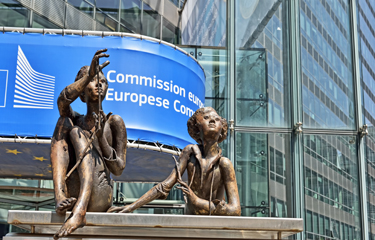A fifth round of sanctions against Russia, including a ban on imports of Russian seafood, has been proposed by the European Commission, amid fresh allegations Russia has committed war crimes during its invasion of Ukraine.
European Commission President Ursula von der Leyen said on Tuesday, 5 April, she expected seafood to be among EUR 5.5 billion (USD 6 billion) worth of specific import bans, along with wood, cement, alcohol, and other products. Von der Leyen said the move would seek to “cut the money stream of Russia and its oligarchs,” and also close financial loopholes that currently exist between Russia and Belarus.
Russia is “waging a cruel and ruthless war” against Ukraine, von der Leyen said. The proposed sanctions will put sustained economic pressure on Russian President Vladimir Putin and the Russian government.
“The [previous] four packages of sanctions have hit hard and limited the Kremlin's political and economic options. We are seeing tangible results. But clearly, in view of events, we need to increase our pressure further. Today, we are proposing to take our sanctions a step further. We will make them broader and sharper, so that they cut even deeper in the Russian economy,” she said.
The proposed six pillars of the new sanctions package also includes an import ban on coal from Russia, worth EUR 4 billion (USD 4.4 billion) per year; a ban on Russian vessels and Russian-operated vessels from accessing E.U. ports, with certain exemptions covering essentials such as agricultural and food products, humanitarian aid, and energy; and a ban on the participation of Russian companies in public procurement in E.U. member-states.
On 4 April, the European Council released a statement that condemned alleged atrocities committed by Russian armed forces in Bucha and other Ukrainian towns involving large numbers of civilian deaths and casualties, and called for Putin to stop the war “immediately and unconditionally.”
“Russian authorities are responsible for these atrocities, committed while they had effective control of the area. They are subject to the international law of occupation,” the council said. “The perpetrators of war crimes and other serious violations as well as the responsible government officials and military leaders will be held accountable. The European Union supports all measures to ensure accountability for human rights violations and violations of international humanitarian law in Ukraine by Russian Armed forces.”
The council added that it “fully supports” the investigation launched by the International Criminal Prosecutor into war crimes and crimes against humanity. The council also confirmed the E.U. is assisting Ukrainian authorities with the collection of evidence of war crimes.
Photo courtesy of skyfish/Shutterstock







